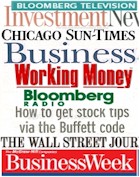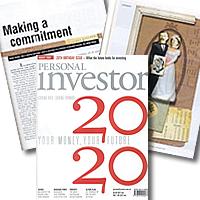 |
|

August, 2003
|
COVER STORY
Making a commitment
By John Price
If you think of buying a stock in terms of
getting married, many people do not contemplate a relationship
lasting beyond the honeymoon.
Others think simply of a one-night stand.
There are even those flirts for whom a kiss on the cheek
is the longest commitment they can tolerate. I know traders
for whom owning a stock for 15 seconds is too long!
The software 'Conscious Investor' (see below),
has developed methods and tools for choosing stocks to which
you may well stay hitched for the rest of your life.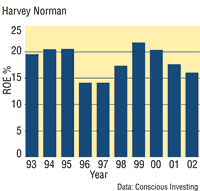
The methods are based on those of Warren Buffett,
the great genius of long-term investing. Buffett, the chairman
and CEO of the US company Berkshire Hathaway, focuses on
the long-term, referring to himself as a Rip Van Winkle
investor, and his record stands alone. Suppose you invested
$10,000 in one of his original partnerships back in 1956
and rolled it over into Berkshire Hathaway when they terminated
in 1969. Today that investment would be worth more than
$280 million - after all taxes, fees and expenses.
In the spirit of Buffett, we will look for
stocks we intend to hold for a very long time - for at least
the next 20 years. We get an idea how to proceed in a statement
made by Buffett in 1996: 'Your goal as an investor should
be simply to purchase, at a rational price, a part interest
in an easily understandable business whose earnings are
virtually certain to be materially higher, five, 10, and
20 years from now.'
To be able to make anything like a reasonable
forecast of earnings over 20 years means we should look
for companies with products and services that have a strong
and sustainable competitive advantage.
Such an advantage is like an economic moat.
It helps protect against the enemies of sustained profitability,
such as changes in the buying habits of consumers, existing
and new competitors, government legislation, and the general
economy.
Economic moats can include brand names. Buffett
cites the examples of Coca-Cola and Gillette. People ask
for these products by name, not just for 'a cola drink'
or 'a packet of razor blades'.
Other possibilities are protection through
patents and licences. This is one of the reasons why drug
companies are willing to spend billions of dollars on research.
When they do come up with an effective new product, they
can be pretty sure of their revenue for a lengthy period.
With a strong and sustainable economic moat,
we can have more confidence in any earnings forecasts. Also,
the continued success of such a company is less dependent
on managerial decisions. Most investors love this idea.
Westfield Holdings is an example of an Australian
company with a strong economic moat. In many cases, once
Westfield establishes a shopping centre, it controls the
retail activity in the entire region.
A strong economic moat also helps to ensure
stability in the growth of earnings and sales. Careful long-term
studies carried out show that, if there has been earnings
and sales stability in the past, future growth of earnings
is likely to continue on the same track.
The long-term price of a stock depends mainly
on the growth of the earnings. So it is important to have
forecasts as accurate as possible.
When you have earnings stability, you have
more idea of the revenue and earnings growth over the next
10 or 20 years - not exact numbers, but at least a workable
range.
Certainly, such forecast ranges can be done
with much more accuracy than that of, say, a television
station or an internet company.
Compare the earnings per share (EPS) charts
for Westfield and Prime Television. Clearly, you are going
to have a much better chance of making a reasonable 'guesstimate'
for the growth of Westfield than for Prime.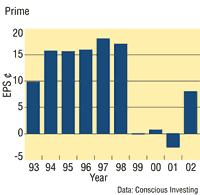
Look, too, for a high and consistent return
on equity and return on capital. Think of these as measures
of how well management is doing with your money. If you
invest in a company that over the years makes, say, 5 per
cent return on capital, guess how much you are likely to
make in the medium to long term. Of course, you are going
to make around 5 per cent. After all, money can't come from
nowhere.
The chart at below shows the return on equity
for Harvey Norman. This is the type of management performance
that we look for when considering a long-term investment.
Understanding the business is important. Another
important part of investing is to like the products and
services of the companies that you are investing in. We
believe that it makes you a more savvy investor, better
able to judge the progress of the company.
You'll be more alert to changes, such as the
merchandise losing its edge or management feathering its
own nest with fancy offices, long before they have any impact
on the financial statements. You'll know when it is time
to get out - or buy more - well before any analysts' reports.
Investing becomes more fun as you observe
a truck from 'your' company making a delivery, or an advertisement
describing the virtues of one of 'your' new products.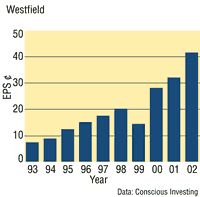
Another aspect when investing for the long
term is to look for companies you can wholeheartedly support.
Investing in AMP may be profitable. But the shine is removed
when you keep reading articles about the incompetence of
the management and the self-serving decisions that have
been made.
To continue the marriage analogy, it would
be like getting married to someone for their cooking ability
while ignoring their habit of dipping into your savings
account. It may be a joint account and it may all be legal.
But in the end it is likely to lead to an acrimonious, expensive
divorce.
Also, if there is the slightest whiff of unethical
or illegal behavior, it is best to move on. It is just not
worth the risk. As we have seen with HIH and One.Tel, collapses
can happen with frightening speed when small misdemeanors
are revealed as the tip of an iceberg.
OK, we are looking for a life partner. Or
partners. At least partners for the next 20 years. One basic
rule is to take your time. When you are talking about 20
years, what's another six months or so?
We have our money ready. Where do we start?
The first thing to look for are constants in Australian
society. What habits do we have that are not likely to change
much at a fundamental level for 20 years or more? Once we
decide on these, seek out the companies that operate in
these areas. Look for those that have products and services
that satisfy these habits and are sensitive to changes in
the way they are expressed.
For starters, it is unlikely that our love
affair with private cars will change much over the next
20 years. What form cars will take is a difficult question,
but whatever it is, I have no doubt we will want to spend
large amounts of money on them.
It is not easy to invest directly in car manufacturers
from Australia. Even then, such companies tend to have modest
returns. But the same does not apply to accessories. ARB
Corporation specialises in all those add-on goodies sought
after by off-road and four-wheel-drive aficionados. The
company is small enough to quickly adapt to changes in the
market, but big enough to have an impact and know what it
is doing. Almost 20 per cent of its sales come from the
USA.
Another affair of the heart is with our homes.
And, as prices go up, we are likely to spend increasing
amounts on all the extra comforts - new furnishings, electrical
goods, home entertainment systems. Buffett loves these types
of companies, and with good reason.
Harvey Norman would be my pick in this area.
It has a consistent return on equity as seen in the chart.
The Freedom Group could be another contender. It is not
just Freedom Furniture it also owns Guests, Capt'n Snooze
and Bayswiss brands.
People are quicker to rip out their old bathrooms
and kitchens these days, a trend that is likely to continue.
Harvey Norman is getting its share of this market through
its kitchen and bathroom centres.
There is some feeling that Harvey Norman has
gone about as far as it can go in Australia. That may be
so with the lines that it has now, but there is nothing
to stop it continuing to buy or franchise other retail companies
- as it has done with Rebel Sport and Domayne stores - then
transferring its managerial skills and style. In any case,
Gerry Harvey, Harvey Norman's co-founder and chairman, is
quietly looking for overseas opportunities and already has
operations in New Zealand, East Timor, Europe and Singapore.
'It might be that we can even get up into
India and China at a later stage,' Harvey was recently reported
as saying. 'And I would love to go to America, but I've
got to find a business model that I am going to be comfortable
with.'
One downside of Harvey Norman is that perhaps
it is too dependent on its co-founder, and there is no sign
that he is giving serious thought to his successor.
Another constant in Australia is our love
affair with shopping in general. In this area it is hard
to go past Westfield Holdings. As described above, it has
a very strong business model. Competition may increase,
though, as it already has in the US, where shopping malls
are generally less profitable.
Other areas that will continue to grow are
financial services and health care.
Consider financial services. Perpetual Trustees
is a billion-dollar company offering a full range of services
from funds management to share registry services. For the
past six years, its return on equity has been a healthy
20 per cent or so.
Instead of going straight for health care
through companies such as the Mayne Group, I would consider
Cochlear as a strong contender. A world brand name coupled
with recognised leadership in the area of hearing implants
gives this company an enviable economic moat.
Certainly it has a high p/e ratio. But when
you are thinking of holding a stock for 20 years, paying
a little too much becomes less of an issue.
Another five stocks you might consider are
Toll Holdings, Flight Centre, ANZ, Tempo Holidays and Count
Financial.
Toll Holdings started in Newcastle in 1888,
with Albert Toll hauling coal with a horse and cart. In
1993 it listed as a public company and now has a market
cap of more than $2 billion. Its competitive advantage is
that it can provide a complete range of services to clients
in an integrated structure.
Airlines are a commodity capital-intensive
business, with people willing to fly with almost any carrier
provided it is the cheapest. So instead of going for an
airline, perhaps it is better to choose a company that services
all travelers. Flight Centre has a reputation for providing
the cheapest tickets.
Banks? Which bank to partner with over the
next 20 years? My feeling is that it will be the bank that
has a clear understanding of what it can do best, then has
the discipline to stick with it and say no to everything
else.
Wells Fargo is an example of a bank doing
just this in the USA. In 1983 it stopped trying to be global
player and focused on being the best in its home market
with an emphasis on the western states. Its average return
over the next 20 years was a remarkable 17 per cent a year.
Consequently, it far outperformed its giant rivals, such
as the Bank of America, which had an average yearly return
of 9 per cent over the same period.
Possibly of the big four Australian banks,
ANZ is the farthest along this route. Another point in favor
of ANZ is that it has had the highest average level of return
on equity over recent years.
Got a national company, and you need a cleaner
for its offices and facilities? Tempo is well-positioned
to keep growing with the move of companies of all sizes
to outsource as many services as possible in order to focus
on their core business. Tempo's divisions are cleaning,
security, facility management, catering and courier services.
Something a bit more speculative is Count
Financial. Founded in 1980 by Barry Lambert, it has been
public only since December, 2000, but is now Australia's
largest accountants-based financial and investment advice
group. There is little doubt it is in a growth area, so
if it keeps pace with it it could be welcome addition to
a long-term portfolio.
Other areas in which you might look for life
partners are entertainment and media. In fact, the whole
market is open to you. Just take your time. Look around.
Perhaps even date a few stocks to get to know them better.
Then quietly add the chosen few to your long-term portfolio.
Conscious Investor uses the research of John
Price based on the methods of Warren Buffett. With default
or user-defined settings, the software sorts through fundamental
data of all stocks in the ASX and more than 6000 US stocks.
These stocks are then analysed in more detail using proprietary
analysis and graphing tools to calculate their return under
different 'margins of safety', establishing the difference
between the economic value of the business and the price
being asked for by the market
STAEGR is a registered trademark of John Price
|
